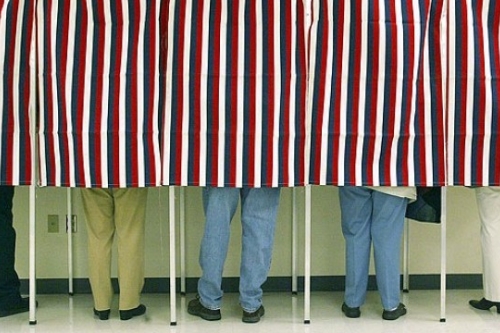
It doesn’t take a genius to see that women in 2013 are public property. We’re heckled on the street by men who feel entitled to our bodies; our decisions are continually up for debate and judgement; even choices about our own reproductive systems are not truly ours to make. The way we present ourselves is picked apart, chewed up and spat out at our feet, where we fall down again scrabbling around to put it all back together. The patriarchy feeds on this public ownership of women – the ability to judge us, to manipulate us and to undermine our choices. So when a man judges us by these standards, it can be rage-inducing and tiresome, but when another woman does so it’s truly upsetting. If we can’t help each other, then who will help us at all?
That women’s bodies belong to the masses is not news to anyone who has spent longer than ten seconds reading The Daily Mail or, in fact, almost any major publication. If we’re not ‘flaunting our pregnant bellies’, we’re ‘pouring our curves into a tight dress’ or ‘showing off our bikini bodies’. So far, so celebrity pullout. But this commodification of the female body took a sombre turn this week with actress Angelina Jolie’s announcement that she has undergone an invasive double mastectomy in order to beat her 87% chance of developing breast cancer. “I do not feel any less of a woman. I feel empowered that I made a strong choice that in no way diminishes my femininity” she writes in her articulate New York Times op-ed which, she makes clear, she chose to publish in the hope of helping other women know their options, and confront any fears of them. For what it’s worth, I think she’s done an incredible thing; for a sex symbol to have both breasts chopped off, and then choose to write about it for no personal benefit but to help others, is heartening. She notes that she is undergoing reconstructive surgery, and that she’s managed to keep all her work engagements throughout the intensive surgery: none of us had to be any the wiser. Angelina Jolie made a brave and difficult decision before she even chose to write her article, and then she made another one.
But this isn’t about what I think. Rather, it’s about the wave of criticism that she was inevitably met with upon the publishing of her NY Times piece. Reactions broadly fell into two camps; the bare-faced sexism which saw infantile comments such as “Poor Brad” and “R.I.P. Boobs” marked up, and the reactionary feminism which accused Angelina of not checking her privilege and endorsing a screening test not accessible to many women because of costs and flaws in the US healthcare system.
The first of these reactions can quite simply be put down to classic sexism and male entitlement and, actually, I don’t think such comments deserve to be dignified with any further discussion. The points made by the second camp of critics, though, are valid; I’m all for checking my privilege, and I fully support a free, universal healthcare system. It’s just that I’m not sure it’s within Angelina’s power to solve all this. She does, in fact, acknowledge the expense of the mentioned screening test, calling it ‘an obstacle to many women’. What more can she do? She’s fairly busy raising a family, making a living and campaigning against sexual violence as a weapon of war, that selfish bimbo. The fear and pain that she must surely have felt throughout both decision and procedure is no less because of her bank balance. Angelina has, throughout her career, dedicated a huge amount of time to trying to help other women from all walks of life. Why is it that as soon as a woman achieves a modicum of success, we expect the world from her?
But I digress. The point in all of this is that it makes me incredibly uncomfortable when men and women alike feel entitled to whip out their soapboxes and publicise their feelings about what another woman has decided to do with her own flesh, blood and muscle. We don’t own Angelina Jolie; decisions she makes about her own body belong to her.
This rule holds true for all consenting adults – and that includes sex workers, whether you like it or not. Journalist Suzanne Moore doesn’t like it apparently; in fact, she writes in The Guardian that she’d rather just call them whores because, call her old-fashioned, but “some ‘sex work’ is a bit rubbish. Being locked in a room for 16 hours, gouged out on smack, feeling tired, lonely and ill, often without even being able to speak much English, is not so empowering after all. But it’s not the sex that’s the problem, apparently, its the working conditions (we must not stigmatise sex workers)”. Maybe some of those privilege-checking Angelina Jolie critics could come and help me out here because I genuinely don’t know where to start with ths elitist vitriol. The snarky inverted commas around ‘sex workers’? The complete silencing of sex workers’ voices that Moore is engaging in? The fictional account she’s used to justify her horribly offensive comments? Maybe the accompanying picture is as good a place as any, seeing as it ironically depicts a woman holding a placard with the slogan “My body to give. Not yours to take”. Well, quite. Bizarrely, this is actually an article about sex trafficking and child abuse, and so Moore manages to conflate these issues with sex work, single-handedly obscuring a dangerous and important problem, while actually putting sex workers in more danger than the hypothetical risk she imagines them to be facing in in the first place. Nice work.
The point is this: if you look at a sex worker and think that she is any less of a woman because of her working decisions, then I’m inclined to say that that is solely your own problem. It’s not for me to preach about why women go into sex work, but (and I’m happy to be corrected on any of this by someone with real experience) I would imagine it’s for a variety of reasons – some because they really need money, some because they can’t do anything else, some because they genuinely love the job. It sounds a bit like me really; I can’t say my formative years spent wiping children’s noses in an after-school club or refolding jeans in Topshop were so because there was nothing I wanted to do more with my life. The arbitrary line drawn by Moore is her own, and yes, it’s shared by a lot of people, so it’s often reflected in law – but to me it says more about them than it does about the women they are so quick to judge. At the end of the day, Moore’s comments smack of the type of feminism which, put shrewdly by writer Sarah Woolley recently, “will fight fervently for a woman’s right to choose until they no longer trust her with that right”.
The point in all of this is that holding women’s choices up for scrutiny reinforces all the stereotypes and binaries that the patriarchy already uses to police us. Continually we are our own worst critics. But everytime we tut about the make-up and outfits of this year’s female Apprentice candidates, or raise our eyebrows at Kim Kardashian’s pregancy wardrobe, we’re fracturing our own progress a little bit more. There will be those that say I’ve engaged in exactly what I’m criticising by picking out Angelina Jolie’s critics, or Suzanne Moore’s Guardian article, but that is to miss the point. Of course we should challenge and criticise and even judge each other, as long as it’s on terms that aren’t dictated by our gender. Men are criticised and judged all the time, but for the most part their personal decisions, choices and physical attributes aren’t up for public scrutiny. Perhaps our judgements really are just mirrors to our own prejudices and fears, but all is not lost – as American journalist Sidney J. Harris put beautifully, “the whole purpose of education is to turn mirrors into windows”. I can’t help but think it’s high time we started doing just that.









